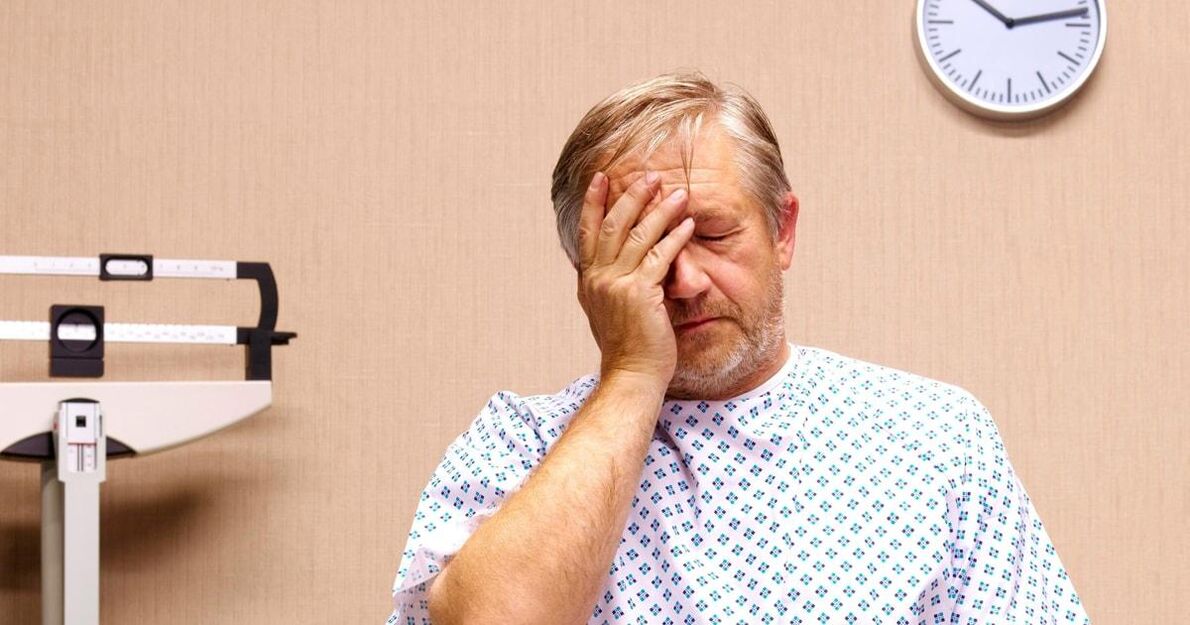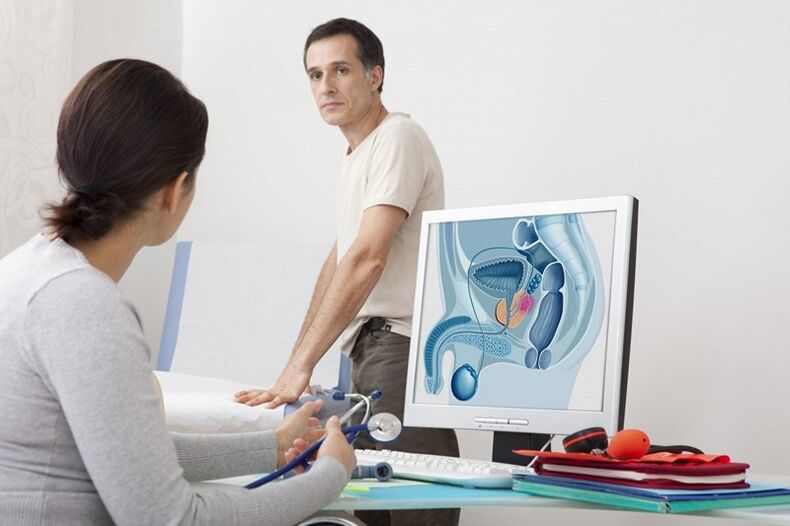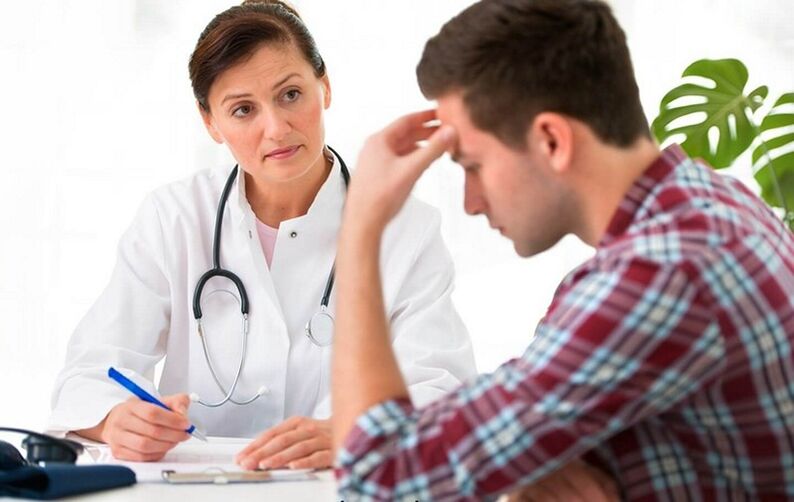One of the most common diseases in men is prostatitis. Under no circumstances should treatment be delayed because the prostate performs important functions and its inflammation is stimulated by a dangerous infection. How do the symptoms of prostatitis manifest in men?

The signs that can be used to diagnose this disease are discussed below, and treatment methods are considered.
Signs of illness
There are usually three types of painful symptoms:
- Disorders of the urogenital system. During urination, the groin area is accompanied by a cut and a constant stimulus to use the toilet. Blood flow is possible. Urination is done in small portions;
- Sexual dysfunction. It is accompanied by pain in the duct in the rectum during ejaculation. Potency decreases, release is frequent, orgasm is lost. Decay or complete absence of an erection also occurs;
- Disorders of the nervous system. They are accompanied by apathy, aggression, psychological and emotional anxiety.
Disease types
Chronic prostatitis
In chronic prostatitis, symptoms occur only during exacerbation. There are no symptoms during remission. Fever, fever pain, sweating, insomnia, loss of appetite, nausea, fever and chills may occur during illnesses. Headaches are not excluded.
This type of disease is caused by fungi or viruses that enter the organs of the lower pelvis. Representatives of such fauna are E. coli, staphylococcus and chlamydia. It should be noted that Helicobacter is not on the list of causes - this is natural as it does not cause prostatitis.
Of course, we all have disease-causing microbes. However, the human body is designed so that the immune system prevents them from multiplying. Therefore, if the protective function is impaired, one can easily become a hostage to inflammatory processes. Seek medical attention at the first sign of symptoms. He performs a rectal examination, performs the necessary examinations, and prescribes treatment.
Bacterial prostatitis
These types of diseases are caused by pathogenic bacteria. The symptoms are the same as during chronic prostatitis. This is the bacterial prostatitis that most often takes a chronic form. Such inflammation should be treated comprehensively. Only the general effects of medications, prostate massage, and other physiotherapy procedures prevent the disease from entering a chronic stage.
Competent urologists prescribe antibiotics. They kill all pathogenic microorganisms. It is very important that you come to the doctor on time. Once the condition improves, you should not stop taking the medication as it may worsen the result and you may suffer from this disease for many years.
Sclerotic prostatitis
Sclerotic prostatitis occurs in people who have persistent constipation and are taking certain medications. The disease is manifested by a decrease in the size of the prostate and a thickening of its tissues - this type of disease is incurable.
Prostatopotic inflammation of the prostate
The causes of the prostatopotic type of the disease have not yet been elucidated. Aching pain accompanies the groin. Treatment is determined individually by the patients.
Abacterial prostatitis
Abacterial prostatitis is caused by stagnation of semen and circulatory disorders. However, the most common cause is zinc deficiency. It is an important component of the male reproductive system. Zinc is responsible for proper hormone production, potency, and the body's reproductive functions.
Such a disease is accompanied by pulling sensations in the groin, lower abdomen and perineum. Sometimes they give painful feelings to the back and tailbone. This condition can take several months. Anti-inflammatory and hormonal medications as well as herbal medications are prescribed during treatment.
Asymptomatic prostatitis
The peculiarity of asymptomatic prostatitis is that the disease progresses without symptoms. Unfortunately, the disease is already in its late stages. During this time, the prostate becomes greatly enlarged and the urine is damaged. To determine the disease, urine is analyzed for bacteria and white blood cells. Such prostatitis often becomes chronic.
If you don’t have an erection in the morning and often have urges in the dark, it marks the onset of the disease.
Timely treatment should not be neglected as inflammation of the prostate may become chronic. Bladder damage can also occur, making it difficult to go to the toilet. Indifference to health threatens infertility, abscesses, cystitis and sepsis. Some of the consequences can only be cured operatively.
Do not try the treatment without the help of professionals. Consult your healthcare professional before using any method.
Prostatitis is contagious and how to treat it?
Sex life with prostatitis is not prohibited. After all, his absence causes this disease. The disease shown only applies to the stronger sex. However, sperm contain elements that cause inflammation. Therefore, if such sperm are placed on the female genitals, serious problems with the woman's reproductive function can arise. It is very important to protect yourself and follow a healthy lifestyle.
Prostate massage
This method of treating prostatitis is prescribed as an adjunct therapy. In addition, massage is an excellent disease prevention. It allows the urologist to understand at what stage the tumor is. Prostate massage can help prevent sperm buildup, which is a common cause of inflammation.
This procedure relaxes the gland, improves blood circulation and supplies oxygen to the body. It relieves unpleasant symptoms, unpleasant feelings, prevents the development of cancer and normalizes urination.
Urological treatment
When you go to the clinic, you will probably be prescribed medication or surgery. It all depends on the stage of the disease.

Only take this medicine on the advice of a specialist, as some medicines have a number of contraindications.
If the disease does not respond to medication, the patient is referred for surgery. The most common method is transurethral resection. During the procedure, the tumor is removed through the urethra. This type of surgery is most often prescribed in the middle stages of the disease, in the absence of an infectious lesion. This type of intervention does not preserve sexual function.
The best solution is the minimally invasive method. This method involves puncturing the skin and then removing the damaged tissue in the bladder. However, the benefits include a low probability of injury and the penetration of infections and no complications. Such an operation is available at any stage of the disease.
Recommendations
Particular attention should be paid to nutrition. Try to exclude fatty, heavy, spicy and fried foods from your diet forever. Do not use excessive flour products, pastries and pickles. Adjust the menu. Eat only healthy and natural foods, including vegetables and fruits, nuts, lean meats, dried fruits, and freshly squeezed juices.
Avoid alcoholic beverages, coffee, eggs, fatty meats and mushrooms. Forget fatty soups, spicy spices, carbonated drinks.
Take a relaxing bath with herbal teas such as chamomile. It perfectly copes with inflammation, removes toxins, helps the kidneys and liver, restores metabolism. It is worth noting the need for physical activity. Light exercise, swimming in the pool, morning walks and following a special diet will help prevent prostate disease.

If you have ever had prostatitis, see your urologist once a year. This is to monitor your condition and prevent the disease from coming back.





























